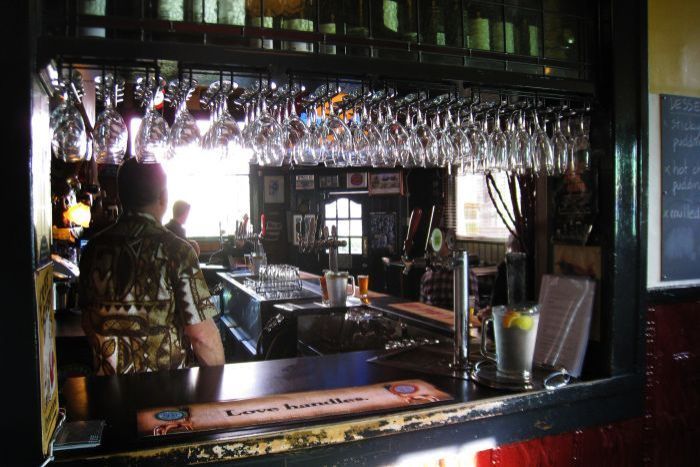Brewers want licence buybacks to curb booze violence

The main bar at Napier Hotel in Fitzroy, Melbourne.
The Brewers Association of Australia says buying back liquor licences may be warranted where there are too many pubs and clubs.
Community anger about alcohol regulation has heightened since the bashing death of 18-year-old Tom Kelly in King's Cross last month.
Association chief Denita Wawn, who represents major companies such as CUB, Lion and Coopers, says each community has to decide what works best to reduce alcohol-related harm.
But Ms Wawn told Radio National's Background Briefing program that the option of licence buybacks should be on the table.
"There may well be circumstances where licence buybacks could be warranted... for example you look at the King's Cross scenario," she said.
"There are a large number of licensed premises in that area and I understand that the New South Wales Government is undertaking an audit of all of those licensed premises.
"They may well find after the audit that there is too many licensed premises."
Instead, after the audit, the New South Wales Government opted for much weaker action in King's Cross - such as banning glass after midnight and not serving shots or doubles after midnight on weekends.
Ms Wawn's comments are part of growing calls for governments to reverse the deregulation trend in the alcohol industry, which has seen an explosion in the number of licensed premises, and how long they can trade.
"The question we now have to ask ourselves as a society is did we focus too much on deregulation of liquor licensed premises, and not enough on the social implications of that decision to deregulate," she said.
Ms Wawn has also set the association at odds with other alcohol industry groups by agreeing that restricted trading hours can be effective in reducing alcohol-related harm.
The NSW port city of Newcastle introduced restricted trading four years ago for all pubs and clubs in the CBD and assaults then fell by a whopping 37 per cent.
The Australian Hotel's Association has fiercely resisted the Newcastle system being rolled out elsewhere.
But Ms Wawn says reduced trading hours should be considered in areas where current measures are not working.
"It has worked in Newcastle, there is no doubt about it," she said.
'Perfect storm'
Health advocacy leaders have welcomed the call to consider licence buybacks and trading hours.
The head of the Canberra-based Foundation for Alcohol Research and Education, Michael Thorn, says it is the first time he has heard the industry forwarding licence buybacks.
"(I'm) pleased that representatives of industry have advanced such an idea because I think it's something that the governments will seriously look at," he said.
Mr Thorn says it is critically important to take much stronger action on alcohol regulation because Australia is ignorant of the true extent of harm.
"Some would say that we are building a perfect storm," he said.
"Never has alcohol being cheaper than it is today, never has it been more available than it is today, and never has it been marketed more aggressively than it has been today."
He says many politicians don't act because national drinking rates are not getting worse.
But he says the way we measure those rates is flawed.
"We do not even fully comprehend the range of harms from current levels of drinking," he said.
"And what we are finding, discovering is a pretty awful picture. A pretty awful story."
Mr Thorn is calling for the Federal Government to urgently reconsider mandatory health warning labels for alcohol.
Number of outlets
Meanwhile, a top liquor licensing official has called on his government to cap the number of licences that can be issued.
The head of the NSW Liquor Licensing Authority, Chris Sidoti, has openly questioned the number of liquor licences in his state.
"It may be that we have too many outlets. How many bottle shops do we actually want? I think we are reaching the point where we have a large number of outlets but we need to say 'well, in a community of this size, these circumstances, we might want to have a certain number of bottle shops, and a certain number of hotels and we're not going to move beyond that'."
Mr Sidoti is waiting for the results of a density study which he hopes will clarify how many outlets are too many outlets and provide a basis to reform liquor licensing in NSW.
Too easy
Professor Robin Room, top international epidemiologist on alcohol impacts, says even as Australia has learned more about the problems of alcohol, governments have made it easier to get hold of it.
A recent comprehensive report from Victoria's Auditor General shows as the number of liquor licences doubled in that state, alcohol problems ratcheted up.
"And that is quite dramatic in the Victorian data in terms of the ambulance calls going up that alcohol related in the last 10 years," Professor Room said.
He says those calls tripled during the last decade and there were big increases in numbers of people being hospitalised with acute intoxication in the number of alcohol-related incidents of domestic violence and in alcohol related assaults.
Professor Room says while national drinking rates may not be going up, the harms definitely are.
"We know there is a pattern going on amongst young adults of an increased number of people drinking very heavily. Drinking 20 or more drinks on one occasion," he said.
Twenty standard drinks is almost a bottle of spirits.
Professor Room says licence buybacks, restricting trading hours, and increasing the price of alcohol will all work in reducing alcohol related harm.
Source: ABC News, 25 August 2012







